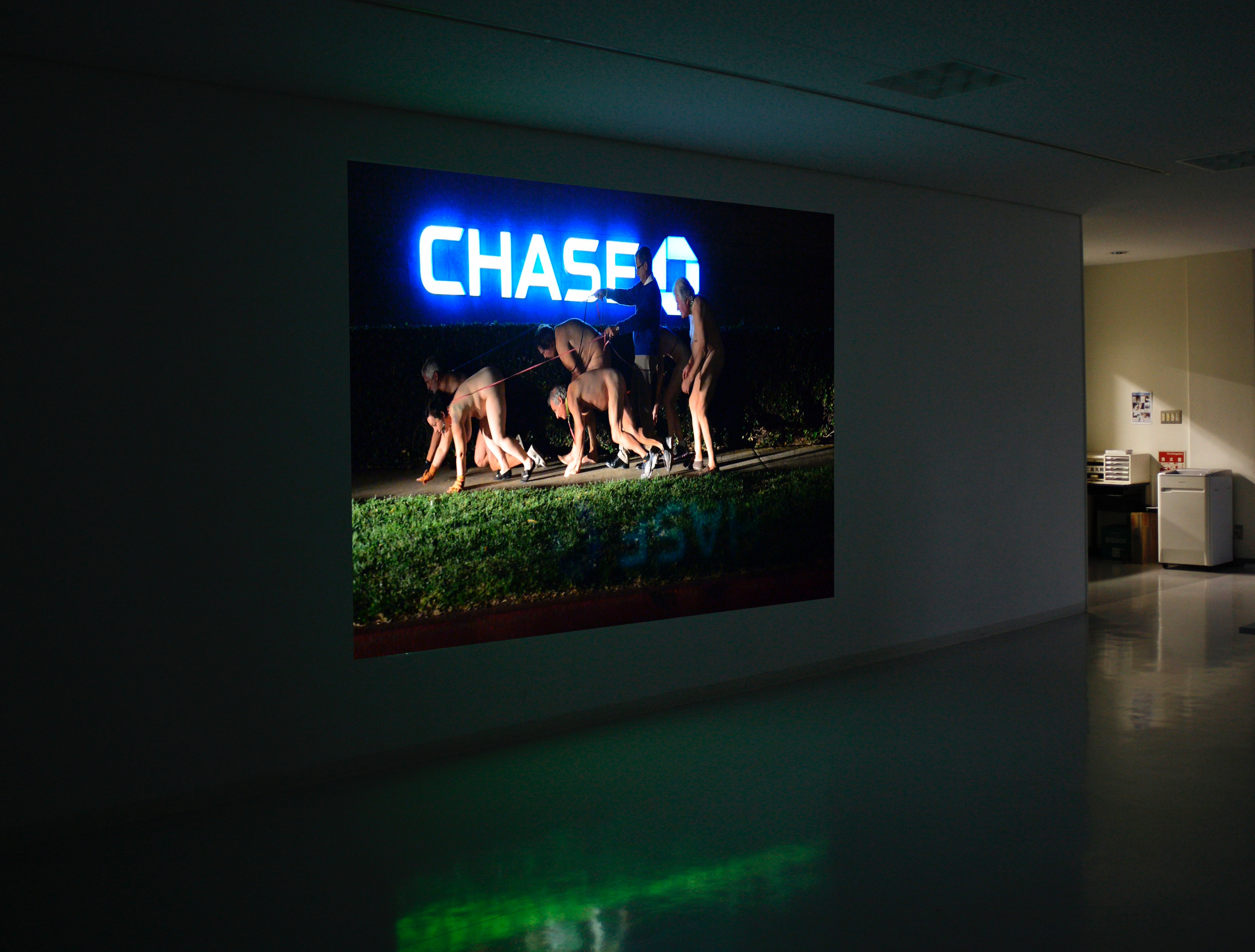
" Yoshua Okon poses challenging new questions to the relation between performance and video, set and location, voyeurism and participation. At the same time, perhaps the major effect of his work is an almost uncanny triangulation between comedy, critique and satire. Almost everything he's done adjudicates, seemingly without effort, between the cultural, aesthetic and subjective dimensions in play between these terms, so that social commentary is laced with humor; irony mediated by self-reflexivity; and improvised action tangled up in webs of class and identity. Okon has used the exchange between camera and director, subject and location, identity and performance to shred and reconvene some of the modernist paradigms addressed in these exchanges in particular those caught up in discourses of the candid and the case study.
Okon's work stages an elaborate retort to these fictions of truth and material reality. First, without in any way fetishizing the camera, he posits video and its mise-en-scene as the leading term of an avowedly open construct. Secondly, instead of concealing his approach and relation to his subjects by effectively stalking them, Okon enters into a form of double contract or agreement based on a partial disclosure of his own status as "director" coupled with an indication of the action he wants (or imagines) a vague script diagram if you like. What results is organized as a commentary on the social permissiveness through which historical trivialization is produced: it is about the experience and circulation not of partial recall, or selective understanding, but of an intermittently knowing and reductive misrepresentation predicated on judgments that are casual and ill-informed."
John C. Welchman is Professor of art history in the Visual Arts department at the University of California, San Diego and Chair Emeritus of the Mike Kelley Foundation for the Arts. His books on art include Modernism Relocated: Towards a Cultural Studies of Visual Modernity (Allen & Unwin, 1995), Invisible Colours: A Visual History of Titles (Yale, 1997), Art After Appropriation: Essays on Art in the 1990s (Routledge, 2001); Guillaume Bijl (JRP|Ringier, 2016); and Past Realization: Essays on Contemporary European Art (Sternberg, 2016). Welchman is co-author of The Dada and Surrealist Word Image (MIT, 1987), Mike Kelley (Phaidon, 1999), and Kwang-Young Chung (Rizzoli, 2014); and editor of Rethinking Borders (Minnesota, 1996), Institutional Critique and After (JRP|Ringier, 2006), The Aesthetics of Risk (JRP|Ringier, 2008) and Black Sphinx: On the Comedic in Modern Art (JRP|Ringier, 2010) as well as the collected writings of Mike Kelley: Foul Perfection: Essays and Criticism (MIT, 2003); Minor Histories (MIT, 2004); Mike Kelley: Interviews, Conversations, and Chit-Chat, 1988-2004 (JRP|Ringier, 2005). He has written for Artforum (where he had a column in the late 1980s and early 90s), Screen, the New York Times, International Herald Tribune, the Economist among other newspapers and journals; and contributed essays to catalogues and associated publications at Documenta (Kassel), the Louvre (Paris), Stedelijk Museum (Amsterdam), Centre Pompidou (Paris), MoMA|PS1 (NY), Tate Modern and Tate Liverpool, Reina Sophia (Madrid), Metropolitan Museum of Art (NY), The New Museum (NY), Albertina, Vienna, Museum of Contemporary Art (LA), LA County Museum of Art, Sydney Biennial, Venice Biennale, Vienna Museum of Contemporary Art, Contemporary Art Gallery (Vancouver), Ludwig Museum (Budapest), Haus der Kunst (Munich), Edinburgh Festival, Vienna Secession, and Museo Nacional de Bellas Artes de La Habana.
John C. Welchman is also giving a lecture about Mike Kelley in Herbert Foundation Ghent on Sunday 16 April 2023.
▶︎ Gratuit sur réservation
▶︎ Conférence en anglais
▶︎ En partenariat avec HISK - Advanced Studies & Practice-based Research in Visual Arts
